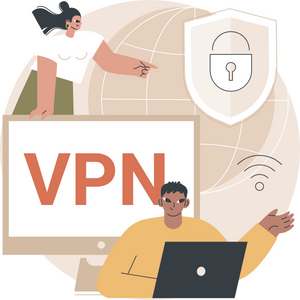What Does A VPN Do?
Virtual private networks (VPNs) may sound frightening, but using these tools is simpler than you may imagine. There are numerous advantages to using a VPN, whether you’re a small business or an individual. Utilizing a VPN makes it safer to engage in activities like travelling and using public WiFi, sending sensitive information, or even just watching Netflix content. Here are the uses of VPN’s in 2022 and beyond.

You will discover what a VPN is, what it works, and some of the most popular VPN uses in this article. We’ll go over both individual and professional applications so you can learn how to use a VPN effectively at home or at business.
A VPN is what?
Your information is protected by VPN software, which hides the IP address of your computer. Your data is encrypted by the software before being sent to servers in distant states or other countries via secure networks. You can access the internet anonymously by using a VPN to conceal your online identity.
Why Use a VPN?
A VPN, in its simplest form, offers an encrypted server and conceals your IP address from businesses, authorities, and would-be hackers. When using shared or public Wi-Fi, a VPN secures your identity and keeps your data hidden from snooping online eyes.
Instead of routing your internet connection to a hosted server, a VPN gets around your own ISP. Users can “relocate” themselves and access the internet from almost anyplace thanks to the widespread distribution of servers. Encryption provides an additional degree of security, especially for companies that routinely use remote access. Additionally, it can be a useful tool for streaming, gaming, and travel.
Many uses for VPN
1. Public WiFi security
3. Data Privacy From the Apps and Services You Use 2. Data Privacy From Your Internet Service Provider
4. Your Government’s Privacy Regarding Data
5. Availability of Any Content, Anywhere
6. Remote Workplace Security
7. Compatibility with Many Smart Devices
8. Wise Spending
Restrictions on VPNs
A VPN is a useful tool to help separate your location from your data, but it doesn’t completely mask your identity. The app you are using while connected to the VPN is still able to utilize your behaviour to customize in-app adverts and content, even whether you participate in a Facebook quiz or like a post on Instagram. They may not know where you are coming from when you browse, but they will still be able to track your activity on their apps.
Similar to this, businesses can track you while you’re on their website and after if cookies are enabled on your computer. Not all of your data is hidden with a VPN. A greater level of security requires combining a VPN’s protection with Tor, an open-source program that enables anonymous online browsing, and additional security measures.
VPNs aren’t ideal tools, though. They are subject to malware and cyber attacks, just like any other computer application. A VPN loses its security advantages if it becomes corrupted.
By using a free VPN service, the risk of attacks and security breaches is raised. “Free” VPN providers may sell user information or display adverts that could include malware in order to cover their operating expenses. Purchasing a premium VPN is your best option if you want to increase the privacy of your data.
